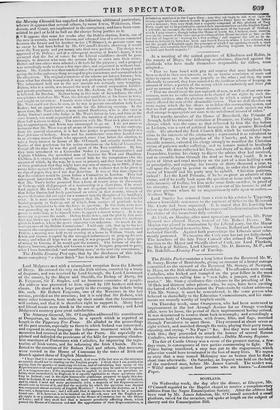Lord .Mitigrave met with a triumphant reception from the Liberals
of Derry. He entered time city on the 25th ultimo, escorted by a troop of dragoons, and was received by Lord Garvagh, the Lord-Lieutenant of the county, by the Mayor and Sheriffs, the Bishop of Derry, Sir 11. Ferguson, Sir T. Staples, and an immense concourse of people. An address was presented to him, signed by 170 bankers and mer- chants. Ile dined with a large party in the evening, the tickets being
30s. each. Sir Robert Ferguson' one of the 1Vaverers in the last session, presided on the occasion ; but it is said that Sir Robert, with many other trimmers, have made up their minds that the Government will endure, and that it is therefore right to support it. Many loyal and liberal toasts were drunk in the course of the evening; and Lord ItIulgrawe's courtesy gave great satisfaction.
The Attorney-General, Mr. O'Loughlen addressed his constituents at Dungarvan, on his reelection, in a speech which is reported at length in the Tipperary Free Press. He alluded to the proceedings
of the past session, especially to those in which Ireland was interested; and exposed in strong language the infamous treatment which these
measures had received at the hands of the Peers. He especially ex- plained and defended the provisions of the bills for preventing clandes- tine marriages of Protestants with Catholics, for improving the regis- tration of Irish voters, and for reforming the Irish Church. He re- ferred to the assertion of Sir Robert Peel and others, that measures
were carried in the House of Commons by the votes of Irish and Scotch against those of English Members-
" I hope that it is not meant to be argued. that even if the fact was so, the measures so carried should nor be binding on the English people- I think that I am justified in saying, that the practice of analyzing divisions, and of calculating how many of the Represeutatives of each portion of the empire the majority may be said to Ira composed of, is a dangerous one ; if the argument can be applied to divisions on questions re- Latina more immediately to England, it is equally applicable to those questions relit- Sing to Ireland ; and is the right honourable gentleman prepared to apply this doc- trine to Ireland, if, on a question affecting more immediately the people of Ireland, and to which I need not more particularly refer, a majority of her Representatives should vote in favour of it, and Red the majority by which the question was decided was composed almost entirely of English Members ? I consider the duettine. as I be- fore said, a dangerous one; and I will add, that it appears to me not to be a constitu- tional one. If it, however, is to be insisted on, let me ask, may not the English peo- ple apply it, or a similar one, not merely to the Clouse of Commons, but to the House of Lords • and if they shall find that a measure peculiarly affecting them, which passed the House of Commons and met the approbation of their Representatives, is defeated or mutilated in the Upper lions may they not begiu to a:17:77= twenty-eight Well and sixteen Scotch Representative Peers have to delay or defeat such a measure ; they may think that a majority composed of this phalanx of Tory Peers ought not to be permitted to control their repotseutatives end the Eualish Peers? 1 will take, for instance, the bill for the disfranchisement of the borough of Stafford ; w1.1,11. I may observe, though before the House of Lords for, I believe, some months, was ou the records of the votes and proceedings of that house recorded so late as the last day of august, us ' waiting for a first reading e and suppose the bill to be de- feated or delayed by forty-four Irish and Scotch Peers to whom I have referred, may not the people of England apply the principle of witch I am speaking to such a state of things, and complain that this bill, peculiarly affecting England, was defeated by an Irish and Scotch majority?'


























 Previous page
Previous page